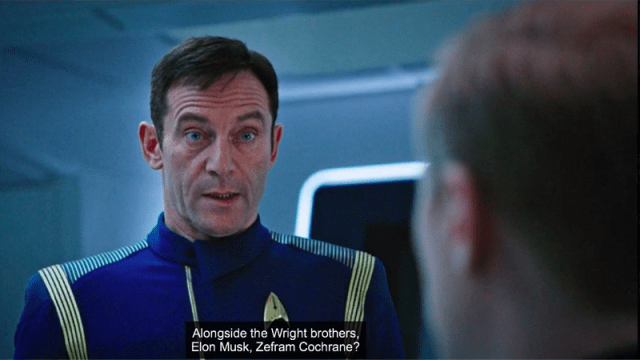By its nature, sci-fi of Shakespeare obsessives. Sometimes it’s…messier.
One of the weirder things always danced around on Star Trek is how its myriad bridge crews, despite being from the 23rd and 24th centuries, are fascinated with a popular culture that is not their own, but more reflective of our own recent past as peoples of the 20th and 21st century. Sisko loves baseball, a sport that, hilariously, apparently just stops being played professionally in 2042 according to Deep Space Nine. Picard loves the pulpy noir fiction of Dixon Hill, an original character for Trek but specifically rooted in the detective fiction boom of the 1940s. Janeway, when she’s not palling around with Leonardo DaVinci, is writing 19th-century Irish village self-insert fic or participating in a dull as hell Austen-esque choose your own adventure type stories.
Logistically, this makes sense, because yes, Star Trek shows are set in the 2200s and 2300s, but they’re written by people who are lived throughout the late 20th and early 21st centuries. Any “recent” cultural content for the context of Starfleet officers wouldn’t exist yet, it’d have to be made up (plus all that old literature is public domain at this point, so Trek teams can use it without having to run the risk of legal issues). But it’s still weird.
Not only has this led to you slowly realising the absurdity that apparently everyone in Starfleet is just like, really big into the Western literary canon of the 18th-20th century and not like…movies or something (at least they gave Tom Paris Captain Proton, but even that is a sendup of our own sci-fi B-movie past, rather than something more recent to his present!). It also, perhaps more depressingly, asks us to consider that the history that will be valued by the time of this idealistic, 24th-century society will almost exclusively be the history of overwhelmingly white, overwhelmingly Western, and predominantly male writers and artists. Which, colonialist readings of Star Trek‘s view of exploration aside, is kind of bad for a franchise that prides itself on being so egalitarian!
The latest mainline entry in the franchise, Star Trek Discovery, has at least attempted to address this more recently exploring histories and cultural stories from the perspective of its black, female protagonist, Michael Burnham. It’s taken small but promising steps to embrace elements of culture from the African diaspora, in its second season, and the recent animated Short Treks episode “The Girl Who Made the Stars” to provide an alternate cultural lens that Star Trek is still sorely lacking. But Discovery‘s attempts to evoke a more modern view of the past”modern to us as the audience, rather than its futuristic characters”don’t always land quite so well in terms of their forward thinking.
Like, say, what is probably one of the moments”outside of like, the explicitly racist ones, looking at you “Code of Honour””that will age the worst in Star Trek‘s cultural history: that time in season one when Captain Lorca name-dropped Elon Musk alongside the Wright Brothers and Star Trek: First Contact‘s Zefram Cochrane as an inspiring pioneer of invention while trying to encourage astromycologist Paul Stamets.
Yes, yes, Lorca ended up being a maga-chanting, horny for space-fascism villain from Star Trek‘s mirror universe, but in the moment here, he’s pretending to be from Trek‘s idealistic prime timeline. Stamets doesn’t bristle at the Musk mention. Hell, they didn’t stop there, Tilly briefly went to a high school named after him! It was bad at the time, considering Musk’s rapid descent from darling of the tech elite at Tesla into everything from alleged union-busting, to publicly calling a random ex-pat in Thailand a “pedo guy,” to a bit of alleged fraud and being rather aggravated over the pandemic, the list goes on. It gets worse almost every time Musk opens his mouth.
[referenced url=” thumb=” title=” excerpt=”]
This past weekend, Musk took to his platform of questionable decision-making choice, Twitter, to quote The Matrix and tell his followers to “Take the red pill.” The Matrix creators, the Wachowskis, intended their movie’s future dystopia“and the “red pill/blue pill” conversation between Neo and Morpheus in particular”to be read as the tool with which people within the Matrix simulation could become aware of the truth behind its fabrication (and therefore fight against the machine-mind rulers controlling humanity through that simulation).
But the terminology has since been co-opted by members of the hate groups of the alt-right, which uses the concept of being “red pilled” as parlance for being able to see the truth of reality and not being a “sheep” like most people. Though the “truth of reality,” in this instance, usually involves hating minorities.
Welcome. https://t.co/EdkGtv69Ry
— Donald Trump Jr. (@DonaldJTrumpJr) May 17, 2020
Your inspiring figure of the 23rd century, ladies and gentlemen. At least other sci-fi creatives beyond the sphere of Star Trek are addressing it a bit more bluntly.
Fuck both of you
— Lilly Wachowski (@lilly_wachowski) May 17, 2020
Yup, that’s the more accurate Musk reference at this point. It’ll definitely age better!
Â
